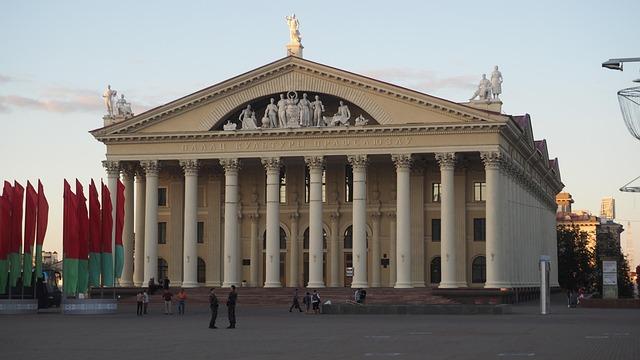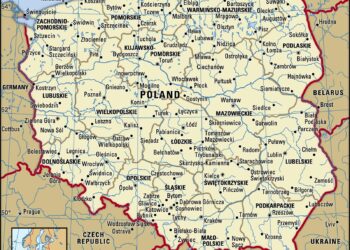As the Vatican prepares to welcome a new nuncio to Belarus, a complex landscape of diplomatic, religious, and social challenges awaits. The role of a nuncio,or papal ambassador,is crucial in fostering relations between the Holy See and the local Church,especially in a nation where political tensions and social unrest have shaped the ecclesiastical environment. This article explores the multifaceted responsibilities that lie ahead for the new nuncio, detailing the geopolitical intricacies, the state of religious freedom, and the ongoing dialog between the Catholic Church and the Belarusian government. With a focus on the historical context and current challenges, we delve into what this diplomatic appointment could mean for both the Church and the people of Belarus.
Understanding the Role of the Nuncio in Belarusian Diplomacy
The role of the Nuncio in Belarusian diplomatic relations is pivotal, navigating the complex political landscape of a country whose history is intricately linked to both its Slavic roots and its interactions with the West. The Nuncio acts as the Pope’s ambassador, a position that transcends mere representation; it requires a deep understanding of local dynamics and a keen ability to forge relationships with diverse stakeholders. As the new nuncio steps into this role, they will be tasked with not only strengthening the Church’s presence but also acting as a mediator in discussions aimed at fostering peace and dialogue in a nation frequently enough characterized by contentious political climate.
In this context, the new Nuncio will face several challenges and opportunities, including:
- Diplomatic Engagement: Building relationships with government officials and civil society organizations.
- Interfaith Dialogues: Promoting unity among various religious groups within Belarus.
- Social Issues Advocacy: Addressing human rights concerns and advocating for social justice.
Effective diplomacy will hinge on the Nuncio’s ability to balance the Vatican’s objectives with the local political realities, where every engagement must be undertaken with sensitivity and discernment, ensuring that the Church’s moral voice is both relevant and respected.

Navigating Political Challenges and Opportunities Ahead
As the new nuncio prepares to take office in Belarus, he will encounter a complex landscape shaped by both domestic and international influences. A delicate balance exists between supporting the local church’s autonomy and navigating the geopolitical tensions surrounding the region. The nuncio’s primary challenges may include:
- Engagement with the belarusian Government: building a constructive relationship while upholding the church’s values.
- Diplomatic relations: Addressing existing ties with other nations, particularly those in the European Union.
- Human Rights Advocacy: Supporting the church’s role in advocating for human rights amidst ongoing political repression.
Conversely, the new nuncio also faces potential opportunities that could influence not only the Catholic community but also broader societal dynamics:
- Promoting Dialogue: Initiating constructive dialogues among various societal factions.
- Strengthening church Leadership: Empowering local church leaders to take an active role in civil matters.
- Fostering International Cooperation: Leveraging international church networks to support peaceful reforms.
| Challenges | Opportunities |
|---|---|
| Engagement with the Government | Promoting Dialogue |
| Geopolitical Tensions | strengthening Church Leadership |
| Human Rights Concerns | Fostering International Cooperation |

Strengthening Catholic Church Relations in a Complex Climate
The appointment of a new nuncio to Belarus comes at a crucial time for the Catholic Church, facing various challenges in a nation where political, social, and ecclesial dynamics intersect. A tactful approach is essential for establishing and nurturing relations with both local authorities and the faithful. The nuncio will need to prioritize dialogue and collaboration, focusing on fostering unity within the church while addressing the concerns of persecuted communities.This requires a delicate balance of maintaining the Vatican’s diplomatic stance while advocating for religious freedom and human rights, which are increasingly under threat in the region.
In this complex climate, several strategic areas demand the attention of the new envoy:
- Engagement with Local Communities: Building trust and rapport with grassroots movements and diverse community groups.
- Support for Clergy: Providing pastoral care and resources to clergy members navigating governmental policies and pressure.
- Promotion of Interfaith Dialogue: Initiating conversations with other religious traditions to cultivate peace and understanding.
Strengthening these relationships will not only serve to uplift the Catholic faithful but will also contribute to the stability of Belarusian society amidst ongoing unrest. The nuncio’s role will be pivotal in articulating the Church’s mission in a way that resonates with hope and resilience.

Addressing Human Rights Concerns and Social Issues
As the new nuncio arrives in Belarus, a pressing challenge awaits: addressing the meaningful human rights issues plaguing the nation.The government’s ongoing suppression of dissent and freedom of speech has drawn international condemnation and scrutiny from numerous human rights organizations. Key concerns include:
- Arrest and detention: Manny political prisoners remain incarcerated under dubious charges, raising alarms about the violation of basic rights.
- Media Censorship: State control over press outlets stifles independent journalism, limiting public access to information.
- Violence Against Protesters: reports of police brutality against peaceful demonstrators highlight systemic issues within law enforcement.
Additionally, social issues intertwined with these human rights violations demand the nuncio’s attention. Economic hardship exacerbates social unrest, creating a fertile ground for further discontent. The church’s influence in Belarus could play a pivotal role in promoting dialogue and reconciliation.Potential areas for intervention include:
| Area of Focus | Potential Actions |
|---|---|
| Advocacy for Political Prisoners | Engage with international bodies to push for their release. |
| Support for Independent Media | Facilitate partnerships with exiled media organizations. |
| Community Engagement | Host dialogues between government officials and civil society leaders. |

Fostering Dialogue Between Faith and Government
The appointment of a new nuncio to Belarus presents a unique possibility for reconciliation and dialogue between faith communities and the government. This diplomatic role is crucial, especially considering the complex socio-political landscape of the country. The nuncio can facilitate discussions that not only address the spiritual needs of the populace but also advocate for fundamental human rights and social justice. Key areas of focus may include:
- Interfaith Collaborations: Strengthening ties between different religious groups to promote unity and peace.
- Advocacy for Human Rights: Encouraging the government to adhere to international standards on freedoms of expression and worship.
- Community Outreach: Fostering initiatives that support marginalized populations, enhancing the Church’s role as a voice for the voiceless.
furthermore,the incoming nuncio will need to navigate the delicate balance of fostering a relationship with the state while maintaining the Church’s moral authority. Engaging in constructive dialogues may require a context-sensitive approach, ensuring that the Church can effectively advocate for its followers without compromising its core values. As part of this strategic mission, the nuncio may benefit from considering:
| potential Strategies | Expected Outcomes |
|---|---|
| Regular Consultations with Government Officials | Increased trust and clarity in Church-state relations |
| Participation in National Dialogues | Enhanced visibility of faith perspectives in policy-making |
| Support for Civil Society Initiatives | Empowerment of grassroots movements and community leaders |

Strategic Recommendations for Effective Engagement
To maximize the effectiveness of the new nuncio’s engagement in Belarus, it is essential to focus on building strategic relationships within local communities and the government. Establishing trust and fostering open dialogue with key stakeholders can pave the way for meaningful collaboration. The nuncio can consider:
- Regular Outreach: Host community forums to listen to the concerns of citizens and address their needs.
- Building Alliances: Connect with local NGOs and civil society organizations that align with the Church’s values.
- Cultural Exchange Programs: promote intercultural initiatives that celebrate shared traditions and foster unity.
Moreover, a robust communication strategy will be vital in shaping public perception and encouraging engagement with the Church. This can be achieved through:
- Social Media Presence: Leverage platforms to disseminate positive messages and engage with younger audiences.
- Media Partnerships: Collaborate with local media to highlight charitable initiatives and community support.
- Transparency Initiatives: Regularly update the public on the Church’s projects and their impact in Belarus.
| Engagement Strategy | purpose | Expected Outcome |
|---|---|---|
| Community Forums | Listening to citizen concerns | Improved trust and dialogue |
| Cultural Initiatives | Celebrate shared traditions | Stronger community ties |
| Social Media Campaigns | Engage younger audiences | Broader reach and participation |
To Conclude
As the new nuncio prepares to assume his role in Belarus, the road ahead is paved with both challenges and opportunities for diplomatic engagement. Navigating the complex political landscape, the nuncio will need to balance the intricate demands of the Holy See with the realities of the Belarusian context, including the ongoing tensions between the government and the opposition, as well as the broader implications of international relations in the region. The nuncio’s mission will not only be to foster dialogue and understanding but also to serve as a vital link between the Church and a nation at a crossroads.As he embarks on this crucial assignment, all eyes will be on how he navigates these challenges while promoting peace, reconciliation, and the dignity of every person in Belarus. The multifaceted role of the nuncio will undoubtedly shape the future of ecclesiastical relations in the country, as well as the Church’s mission in a landscape marked by significant political and social upheaval. The journey ahead is uncertain, but the potential for meaningful engagement remains a beacon of hope for many.















